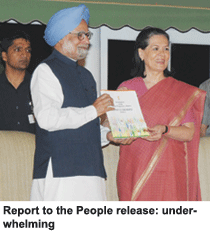 The Congress-led UPA-II government’s self-appraisal document Report to the People 2010-11, released in New Delhi on May 22 to celebrate the second anniversary of its second term in office, trumpets that under its watch, “our economy has enjoyed an unprecedented 8.5 percent annual growth” during the period 2004-05 to 2010-11, and claims “one of our thrust areas has been expansion and strengthening of our education system at all levels — elementary, secondary and higher”. In his foreword, while prime minister Manmohan Singh takes credit for reduction in the number of dropouts, expansion of the mid-day meal scheme to cover 110 million children in elementary education, promotion of girls hostels and ICT (information and communi-cation technologies)-enabled education in secondary schools, and “strengthening a legislative framework by finalising or introducing in Parliament a number of Bills” for higher education reforms, leaders and monitors of the education scene are less than overwhelmed.
The Congress-led UPA-II government’s self-appraisal document Report to the People 2010-11, released in New Delhi on May 22 to celebrate the second anniversary of its second term in office, trumpets that under its watch, “our economy has enjoyed an unprecedented 8.5 percent annual growth” during the period 2004-05 to 2010-11, and claims “one of our thrust areas has been expansion and strengthening of our education system at all levels — elementary, secondary and higher”. In his foreword, while prime minister Manmohan Singh takes credit for reduction in the number of dropouts, expansion of the mid-day meal scheme to cover 110 million children in elementary education, promotion of girls hostels and ICT (information and communi-cation technologies)-enabled education in secondary schools, and “strengthening a legislative framework by finalising or introducing in Parliament a number of Bills” for higher education reforms, leaders and monitors of the education scene are less than overwhelmed.
Amit Gupta, chairman of the education committee of the Punjab, Haryana and Delhi Chamber of Commerce and chief executive of the education publishing company S. Chand, is unimpressed. “The UPA government’s failure to reform higher education and in particular stimulate research in our universities is destroying Indian higher education,” says Gupta.
Such pessimism was also pervasive at the Indian Education Congress convened in Delhi a month earlier (April 22-23). “The country’s 2.5 million village governments (panchayats) are domi-nated by uneducated if not illiterate people and they are responsible for managing 29 subjects, including education, under the Constitution of India. What can you expect of them in terms of improving primary school learning outcomes? Do the UPA government’s education policies and priorities take such stark realities into consideration?” queries Anshul Sonak, president of CORE Projects and former head of Intel’s education initiatives in India.
Ironically, even the UPA-II govern-ment’s historic Right to Free and Compulsory Education Act, 2009 (aka RTE Act), which makes it compulsory for the ‘State’ to provide free and compulsory education to all children aged six-14, is a non-starter. Educati-onists countrywide are alarmed by some of its provisions which abolish all exams and mandate automatic promotion until class VIII, and deny local authorities and school management committees authority over teachers. Moreover its revolutionary proposal to impose a compulsory quota (25 percent) of poor neighbourhood children upon private schools is being fiercely contested in the Supreme Court.
Unsurprisingly, most informed educationists are unanimous that the UPA-II government’s education policy initiatives are floundering in shallows and misery. Far from being operational from April 1, 2010, a majority of state governments are contesting the Centre-state funding pattern ratio and only eight states have notified Rules under the RTE Act. Moreover in higher education, the Foreign Universities (Regulation of Entry and Operations) Bill, 2010 and the National Commission for Higher Education and Research Bill, 2010, on which there is a conspicuous absence of unanimity, have been pending approval of Parliament for over a year.
“The much hyped 100-day agenda of Union HRD minister Kapil Sibal is nowhere in sight even 730 days after the government assumed office. The ministry’s Bills have generated friction and controversy rather than solutions, even as voices of protest in academia are being stifled. The solution is to strengthen the existing education system and take all stakeholders on board. The half-baked neo-liberal reforms proposed by the UPA-II government will destroy the time-tested existing education system rather than improve it. Primary, secondary and higher education institutions need greater autonomy and vast improvements in infrastructure and human resources to meet the growing needs of the country’s youth. Instead the HRD ministry is imposing tighter government controls,” warns Prof. Vijender Sharma, a former president of the Delhi University Teachers Association (DUTA).
Yet according to the UPA-II government’s Report to the People, all is well — and getting better!
Autar Nehru (Delhi)